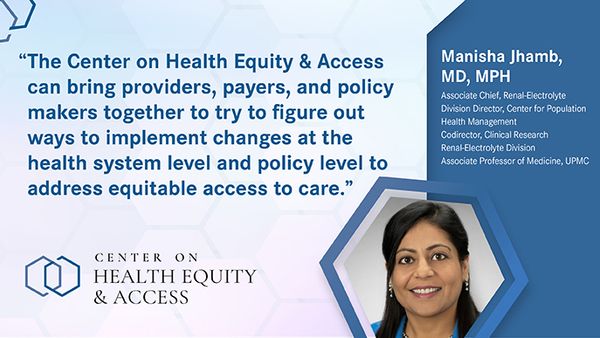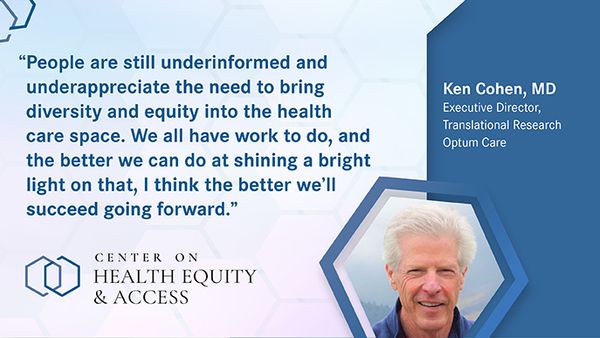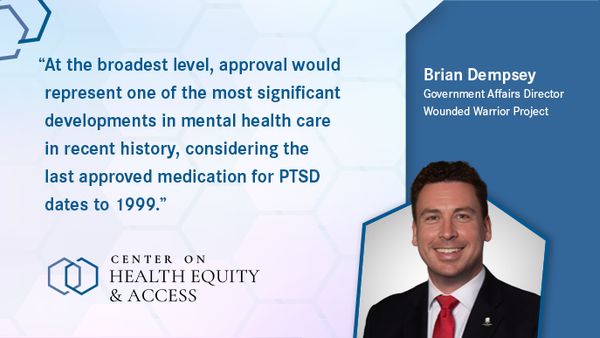
Center on Health Equity & Access
Latest News

Latest Videos

CME Content
More News

The HHS Office for Civil Rights is investigating whether patient data were exposed in the cyberattack on Change Healthcare; a new study claims that the US’ high maternal mortality rates are the product of flawed data; HHS secretary is open to drug testing recipients of welfare.

Research presented at the American Academy of Dermatology Annual Meeting 2024 explored the impact of social determinants of health on hidradenitis suppurativa severity.

The novel findings from a 12-year review uncovered these algorithms can both exacerbate and mitigate racial and ethnic disparities in health care.


The Affordable Care Act (ACA) Medicaid expansions increased health care coverage for American Indian/Alaska Native (AI/AN) women of childbearing age but had limited effects on prenatal care, birth outcomes, and health care supply.

The critical issue of mental health in the workplace was discussed by experts in the field at the recent Midwest Business Group on Health (MBGH) Mental Health Forum, shedding light on the growing concern surrounding alcohol use disorder and the pressing need for innovative therapies.

President Biden will preview his plan to more than double the size of Medicare’s new drug price negotiation program in the upcoming State of the Union address; Mexicans and Central Americans were most affected by the pandemic in terms of all-cause mortality; two Alabama fertility clinics said they expect to resume in vitro fertilization (IVF) services after a bill was passed to protect doctors.

Among food-insecure patients on antihypertensive medication, receiving assistance through the Supplemental Nutrition Assistance Program (SNAP) was associated with improvements in medication adherence.

When compared with patients on traditional Medicare, patients on Medicare Advantage had less intensive home health care, even if they had similar needs.

Identifying and addressing unmet social needs without attention to other contributors to health inequities—such as medical mistrust—is unlikely to yield desired outcomes.

A collaborative service model between a managed care organization and an affordable housing provider reduced acute care use and costs.

Interviews with Katherine Meese, PhD, of University of Alabama at Birmingham, and Nadine Barrett, PhD, MS, MPH, of Wake Forest University, from day 2 of the Association of Cancer Care Centers 50th Annual Meeting & Cancer Center Business Summit (ACCC AMCCBS).

Speakers at the Americas Committee for Treatment and Research in Multiple Sclerosis Forum 2024 focused their attention on avenues to improve research accessibility for investigators and care access for patients with multiple sclerosis (MS).

Advocates for health insurance reform indicate the need to make system-wide, policy-level changes to improve patient outcomes, which include investing in improved access to care and lowering the burden of administrative costs.

In a recent presentation featured at the Midwest Business Group on Health's Mental Health Forum, an expert shed light on the evolving landscape shaped by the Mental Health Parity and Addiction Treatment Act.

Congress is unlikely to include many major health care priorities in the next government funding package; many adults continue to see racism as a problem across aspects of US society; the Endocrine Society will review its clinical guidelines for gender-affirming care.

The Democratic Women’s Caucus is urging insurers to comply with the Affordable Care Act (ACA) contraception requirement to cover birth control without cost sharing.

Fabiola Molina, MD, MHS, is a practicing hospitalist and assistant professor of medicine at Yale School of Medicine and Yale New Haven Hospital. An immigrant from Mexico, her experiences straddling 2 worlds, while attempting to navigate with her family the complicated safety-net system for health care in Texas, were key influences to her ardent focus on health equity.

This week's news from the Center on Health Equity and Access discusses racial disparities in prostate cancer outcomes, the impact of access to cancer care on racial gaps in CLL/SLL outcomes, the effects of 340B programs on drug pricing and health care disparities, the role of mental illness in maternal mortality rates, and racial bias and diagnosis disparities in bipolar disorder.

Patients with ovarian cancer living in rural areas reported less improvement in psychological function compared with patients living in urban areas in the year following ovarian cancer diagnosis.

Shauna Downs, PhD, MS, is an associate professor in the Department of Health Behavior, Society, and Policy at the Rutgers School of Public Health. A former figure skater, her research now focuses on interventions to promote healthy and sustainable food choices and exploring how our changing climate, food systems, diet, and nutrition are inextricably linked.

In honor of Black History Month, Leesha Ellis-Cox, MD, MPH, sheds light on the racial disparities in mental health care and the prevalence of misdiagnosis.

Strengthening parity in insurance coverage of mental and physical health care benefits is critical for addressing the maternal mental health crisis.

In part 2 of our interview with Robinson, he addresses the potential for exacerbated health care disparities in the aftermath of hospital price markups and how insurance plan design often disadvantages the patients who most need expensive infusion therapies but cannot afford them.

No difference in overall survival was observed between patients of different races who had chronic lymphocytic leukemia/small lymphocytic lymphoma (CLL/SLL) and received cancer care or had access to a hematologist/oncologist.

















